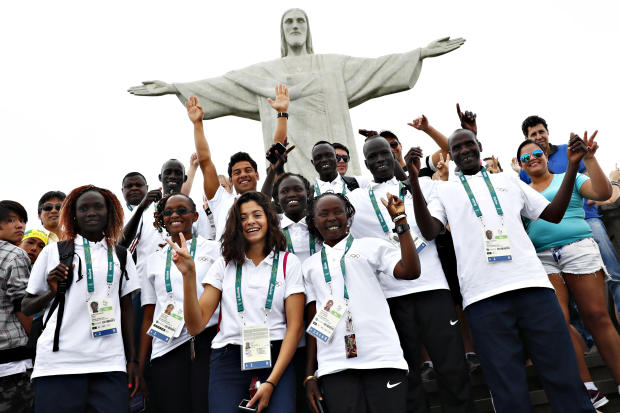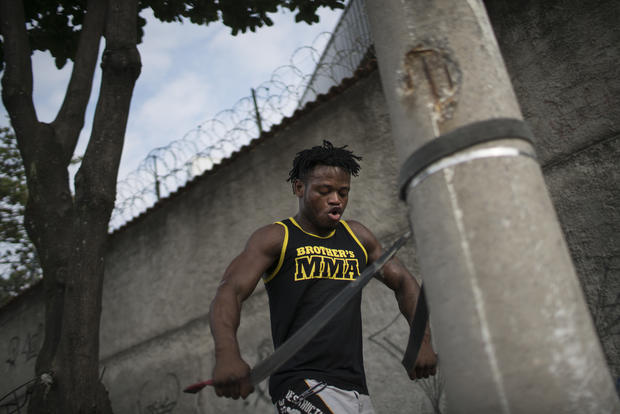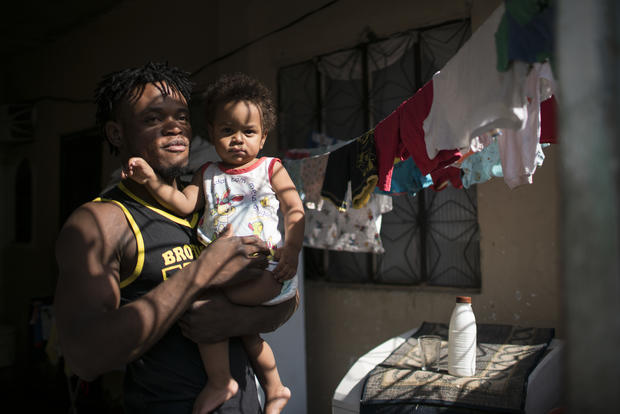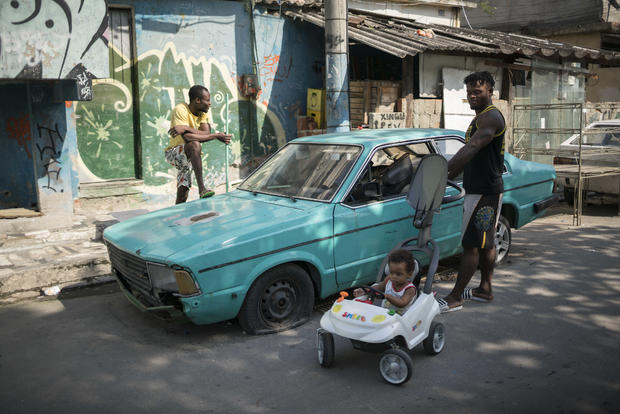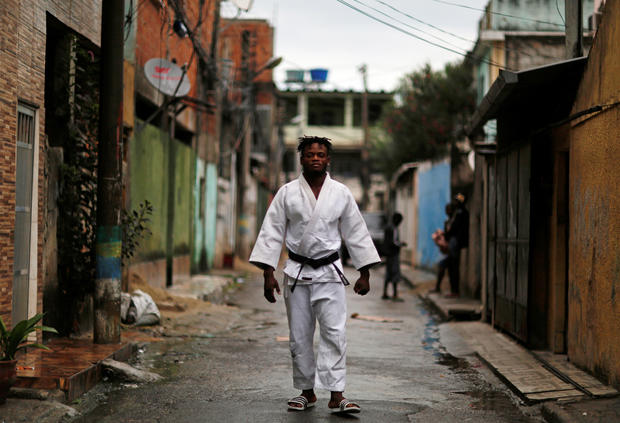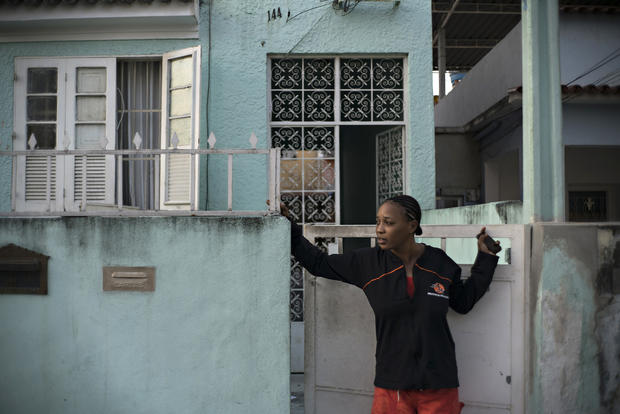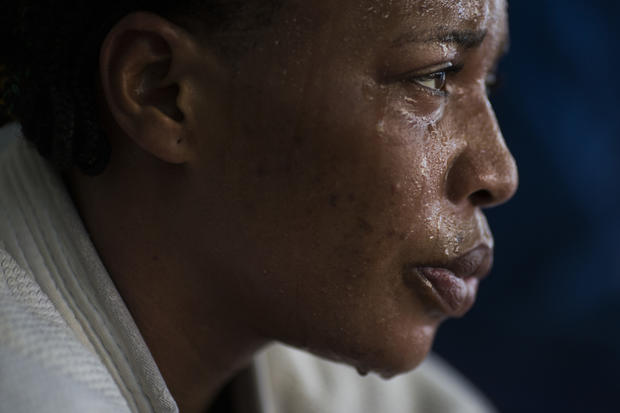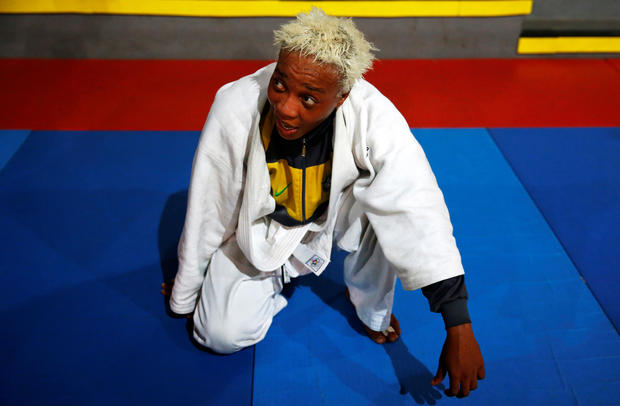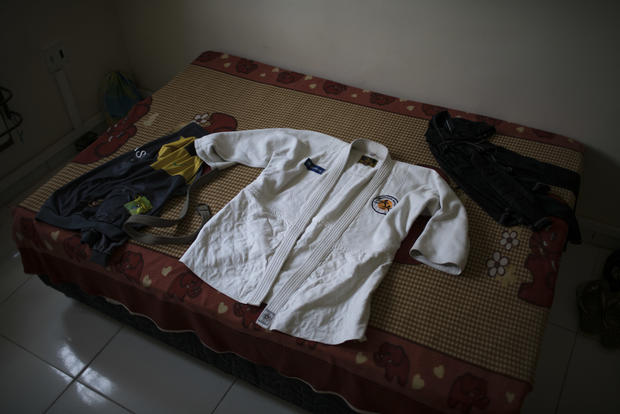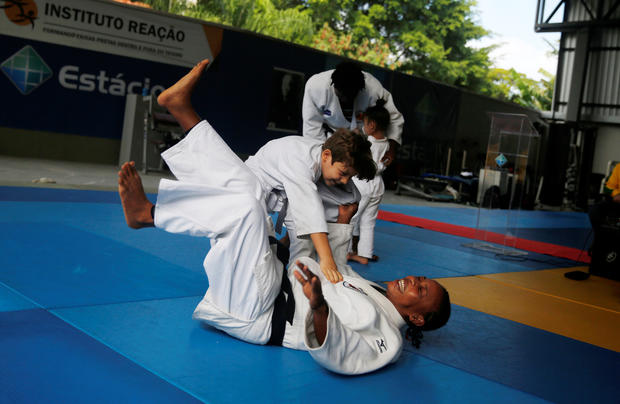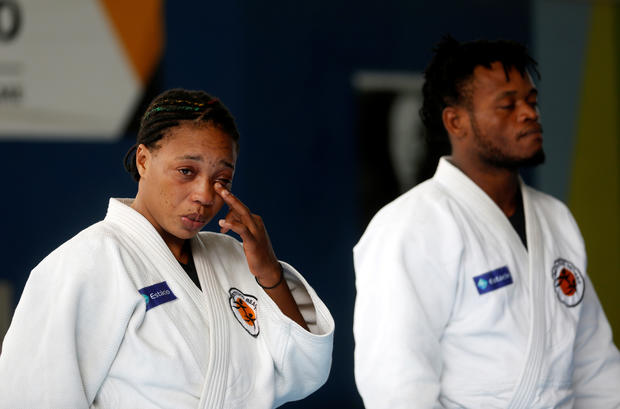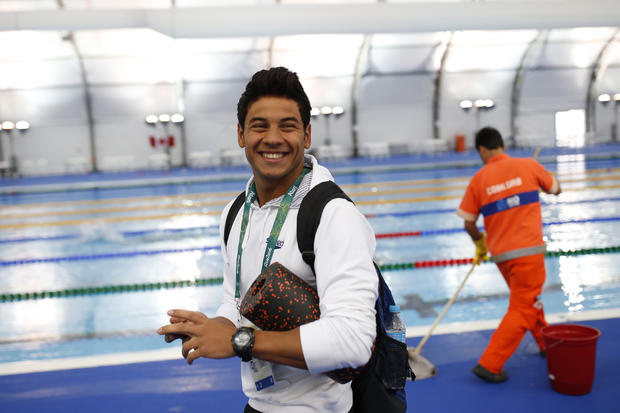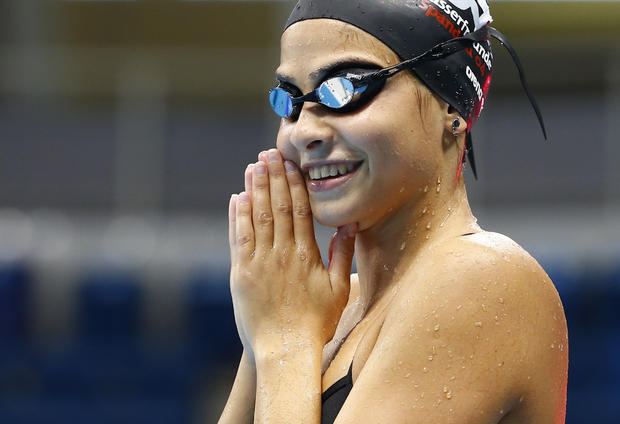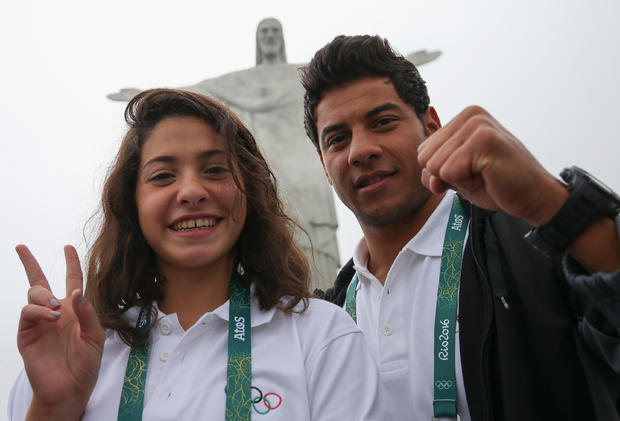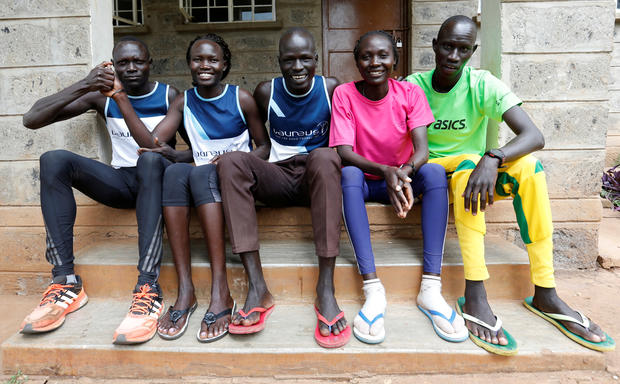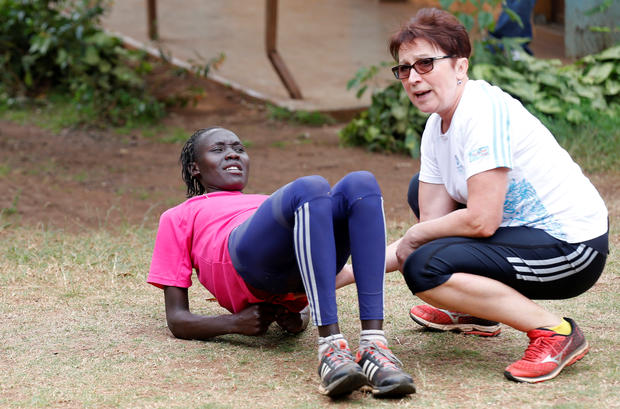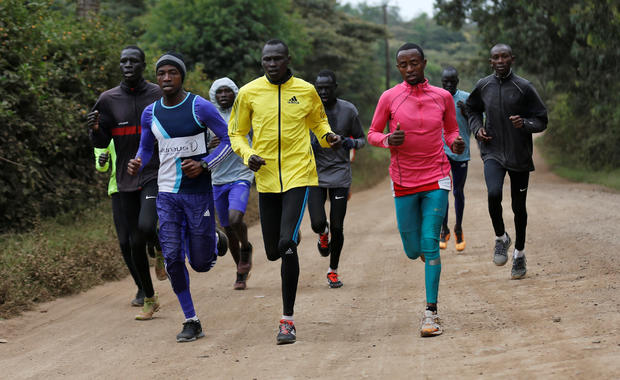Meet the first Refugee Olympic Team
Normally, an athlete represents their home country at the Olympics, but there's a notable exception this year at the Rio Summer Games. Ten refugee athletes will compete under the International Olympic Committee (IOC) banner as part of the first-ever Refugee Olympic Team. These athletes originally come from the world's most troubled hotspots: Syria, Democratic Republic of Congo, Ethiopia and South Sudan.
In a time when the world has seen the largest refugee crisis since World War II, the IOC hopes these 10 athletes will represent the breadth of the crisis and be a symbol of hope.
Click through to meet the members of the Refugee Olympic Team.
DR Congo's Popole Misenga
Civil strife in the Democratic Republic of Congo has caused the deaths of several million people in the central African nation since the mid-1990s. Popole Misenga was 9 years old when he fled fighting in his hometown.
Separated from his family, he was rescued after eight days in the forest and taken to the capital, Kinshasa, where he learned judo at a center for displaced children. He said the sport gave him an outlet and taught him discipline and commitment.
Pictured: Misenga, a refugee and Olympic judo athlete, uses a judo black belt attached to a street light pole to train in Rio de Janeiro, May 27, 2016.
DR Congo's Popole Misenga
Misenga began competing for his home country, but whenever he lost, his coach would lock him in a cage for days with little to eat or drink. Misenga went to the 2013 world championships in Rio de Janeiro, where he was again deprived of food and lost in the first round. He ran off from the team hotel and sought asylum in Brazil, where he gained refugee status.
Pictured: Misenga holds his 1-year-old son Elias at their home in Rio, May 27, 2016.
DR Congo's Popole Misenga
Originally from the Democratic Republic of Congo, Misenga gained refugee status and now lives in Brazil. Here, he talks to a Congolese neighbor as he walks with his son Elias in Rio, May 27, 2016.
Popole Misenga
Popole Misenga, left, studies Portuguese in Rio de Janeiro with fellow DR Congo refugee and judo athlete Yolande Buskas Mabika. Misenga and Mabika now live in Brazil.
Popole Misenga
Popole Misenga poses for a photo near his home in a slum in Rio, June 2, 2016.
For me, this is incredible because a refugee has never participated in the Olympics before," said Misenga, 24. "The whole world will be watching."
DR Congo's Yolande Mabika
Like Misenga, Yolande Bukasa Mabika was separated from her parents as a young child because of the fighting in the Democratic Republic of Congo. She was picked up by a helicopter that took her to Kinshasa, where she lived in a center for displaced children, discovered judo and began competing in major tournaments.
A member of Congo's national judo federation, Mabika says that training was harsh and failure to win medals meant punishments, including stints inside a cell with little food or water for days.
When Mabika traveled to Brazil for the world championships in 2013, her coach confiscated her passport and limited her access to food.
Mabika stands at the entrance of her newly rented apartment in Rio, May 28, 2016.
Yolande Mabika
Mabika takes a break during judo training at the Reacao Institute in Rio, as she trained to make the cut for the first Olympic team of refugee athletes, May 26, 2016.
Yolande Mabika
While in Rio for the 2013 world championships, Mabika escaped harsh training conditions and wandered the streets of Rio looking for food and help.
She eventually settled in Brazil, was granted refugee status and attended Flavio Canto's judo school.
Yolande Mabika
Makiba's judo gi sits on her bed after she cleaned it at her newly rented apartment in Rio, May 28, 2016.
Yolande Mabika
Mabika performs with a child during a June news conference where she was announced as part of the group of refugee athletes who qualified for the 2016 Rio Olympics.
"I am a competitive athlete, and this is an opportunity that can change my life," she says. "I hope my story will be an example for everybody, and perhaps my family will see me and we will reunite."
Teammates Mabika & Misenga
Mabika (L) wipes her tears next to her refugee compatriot Popole Misenga, during a June 3, 2016, news conference where they were announced as part of the Refugee Olympic Team for the 2016 Olympics in Rio.
Syria's Rami Anis
The war in Syria started when competitive swimmer Rami Anis was 20, and Aleppo was one of the hardest hit by the bombings.
Five years ago, his family sent him to Istanbul to live with an older brother. He trained at the prestigious Galatasaray sports club, but because he did not have Turkish nationality, was unable to compete internationally. So last year, Anis crossed the Aegean on a rubber boat from Turkey to the Greek island of Samos. He then set off on a 2,000-mile (3,000-kilometer) trek through the Balkans, onwards to Germany and eventually to Belgium, where he now lives.
Syria's Rami Anis
Anis found a coach in former Olympic swimmer Carine Verbauwen and trained at her club near Brussels. "I wish from my heart that there will be no more refugees and we can go back and participate for our country," Anis says. He specializes in the 100-meter butterfly - an event Michael Phelps will also compete in at the Rio Olympics.
Anis achieved a personal best time of 54.25 seconds in the 100m freestyle heats. Though that put him 56th out of 59 competing swimmers just being at the Olympics is an achievement for him. He received a standing ovation from the crown at the Olympic Aquatics Stadium.
Syria's Yusra Mardini
Eighteen-year-old Yusra Mardini and older sister, Sarah, were among Syria's brightest swimming stars before the civil war changed everything. Yusra represented Syria at the world championships in 2012. But the war intensified and the family decided the sisters should leave Damascus. They went first to Lebanon, then Turkey.
A year ago, the sisters were on a flimsy inflatable dinghy with about 20 other desperate passengers when it started taking on water. Most of the passengers didn't know how to swim, so the two sisters slipped into the water and helped guide the boat to the Greek island of Lesbos. They trekked through Macedonia, Serbia and Hungary, eventually made it to Austria, and finally to Germany, where Yusra has been training at a club in Berlin with coach Sven Spannekrebs.
Yusra Mardini
Rami Anis and Yusra Mardini at the training pool, July 28, 2016. Both Anis and Mardini made the treacherous journey across the Aegean Sea to Greece on rubber boats, having fled war-torn Syria.
"I want to represent all the refugees,'' Mardini says, "because I want to show everyone that, after the pain, after the storm, comes calm days. I want to inspire them to do something good in their lives."
Syria's Mardini & Anis
Swimmers Yusra Mardini (L) and Rami Anis both made the refugee Olympic team after fleeing the war in Syria. Here, they pose for a photo in front of the Christ the Redeemer statue in Rio de Janeiro, Brazil, on July 30, 2016.
South Sudanese refugee athletes
Five track and field athletes from South Sudan qualified for the 2016 Olympic team of refugee athletes: (L-R) Paulo Amotun Lokoro; Rose Nathike Lokonyen; Yiech Pur Biel; Anjelina Nada Lohalith; and James Nyang Chiengjiek. They pose for a photograph after a training session at their camp in Ngong township near Kenya's capital, Nairobi, June 9, 2016.
South Sudan is one of the world's youngest countries, created after decades of civil strife in Sudan. Kakuma refugee camp in Kenya has been home to thousands of Sudanese refugees since 1992 as well as those from Somalia, Ethiopia, Burundi and other African countries. The UN estimates it is home to 180,000 refugees currently, constituting a "small city."
Angelina Nadai Lohalith
Angelina Nada Lohalith, 21, a refugee from South Sudan and a 1500m athlete, hasn't seen or spoken to her parents since she left southern Sudan more than 10 years ago.
Her home was repeatedly attacked, forcing her and her family to sleep in the bush to avoid the nighttime raids. One day they returned to find land mines had been laid all around their homes. After that, her parents arranged for her to get to Kenya.
Angelina Nadai Lohalith
Lohalith stretches with her trainer Natalia Wagner, from Germany, during a training session at their camp in Ngong township near Kenya's capital Nairobi, June 9, 2016.
South Sudanese athletes
Athletes from South Sudan and their training partners run along a dusty road during a jogging session at the Refugee Olympic Team training facility run by the Tegla Loroupe Peace Foundation in Ngong township near Kenya's capital Nairobi, June 9, 2016.
Loroupe, a Kenyan marathon champion, was instrumental in organizing foot races in several refugee camps in Kenya at the behest of the U.N. refugee agency (UNHCR).
James Nyang Chiengjiek
James Nyang Chiengjiek's job as a youngster was to herd cattle when soldiers tried to kidnap him and force him to be a child soldier in South Sudan. At age 13, he ran away.
James Nyang Chiengjiek
At Kakuma refugee camp in Kenya, Chiengjiek joined a group of older boys who trained as long distance runners. He lived in the camp for more than a decade before he was discovered by the Loroupe Foundation.
Loroupe told the IOC about the runners she was working with, which led to the opportunity for them to earn a spot on the refugee team.
James Nyang Chiengjiek (right) runs with Gay Nyang Tap.
Paul Amotun Lokoro
Paulo Amotun Lokoro's childhood memories are of running for his life with bullets whizzing past his head during attacks on his village. In 2006, as a teenager, he left Sudan.
His first sport was soccer, but his talent for running emerged when he was chosen in a group of 40 hopefuls from Kakuma to attend track trials at the national stadium in Nairobi. He was the best of them and will be competing in the 1,500 meters at the Rio Olympics.
Rose Nathike Lokonyen
During one attack on her village, Rose Nathike Lokonyen was trying to find somewhere safe to hide when she came across the dead bodies of her grandparents, two more victims of the terrible violence in Sudan. She was only 7 at the time.
Rose Nathike Lokonyen
Lokonyen attended the Angelina Jolie Primary School in the Kakuma camp in Kenya, a school funded by the Hollywood star. She started running for fun, but excelled at the camp trials and will run in the 800 meters at the Olympics.
Ethiopia's Yonas Kinde
Ethiopian marathon runner Yonas Kinde drives a taxi in Luxembourg to make ends meet when he's not competing. He's also taking French lessons to help him settle in his new home. He's been living in Luxembourg under international protection since being forced to leave his home country, where his life was in danger.
He qualified for the Rio Olympics with a personal best of 2 hours, 17 minutes, 31 seconds at the Frankfurt Marathon last year. "I can't explain to you the feeling," he says of being able to compete at the Olympics. "It's like power. It's amazing. When I heard this news I had big motivation. I got energy."
South Sudan's Yiech Pur Biel
Yiech Pur Biel was a 9-year-old boy caught up in the Sudanese civil war in 2005 when his mother, desperate and with her family facing starvation, left him with a neighbor to go in search of food. His father was a soldier and away fighting. His mother didn't return. Biel is now 21, and he hasn't seen either of his parents since.
When his mother didn't come back, the neighbor decided Biel should go to Kakuma refugee camp. Just a boy, he arrived alone in a camp that was home to nearly 200,000 refugees.
South Sudan's Yiech Pur Biel
In Kenya, he was given the chance to participate in a series of races on World Refugee Day in June 2015 organized by the Tegla Loroupe Peace Foundation, founded by the Kenyan marathon runner.
Biel entered a 10-kilometer trial, and in the first formal race he ever ran in, finished second.
He was selected to go to the Loroupe Foundation's training center and will run in the 800 meters at the Olympics, sharing a stage with Kenya's Olympic champion and world-record holder David Rudisha.
"When we go to Rio we are going to give a message that a refugee can do anything any other human being can do," Biel told The Associated Press.
